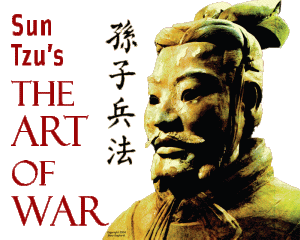Many have written about Sun Tzu’s Art of War for business strategies and some even go beyond to apply these strategies to parenting, education and others. The Art of War was originally written more than two thousand five hundred years ago for the purpose of winning wars. While i am not sure if the concepts can be applied to all areas of life in our modern world, i believe the portion on Leadership remains extremely relevant and useful.
Sun Tzu listed five requirements of generals (leaders). I’ve found many English translations of these wanting. Hence, i will use the original Chinese characters here and use a few English words to interpret each character to the best of my understanding.
1. 智 – This word can be interpreted as Wise and Strategic. The emphasis here is on a leader’s critical thinking ability. In a broader sense, it can refer to a leader’s capability or competence. The ability to think strategically, respond quickly to changes, and anticipate the moves of the enemy is high of the list of Sun Tzu.
2. 信 – This word can be interpreted as Trustworthy or Integrity. Can this leader be trusted? Does the leader do what he says and says what he does? In a broader sense, it can even include being faithful to the common belief or mission. In short, Sun Tzu is looking for a man of his word.
3. 仁 – This word can be interpreted to mean Benevolence or simply Love. The general needs to love and protect his troops and the people he is fighting for. It also means to treat people with respect and kindness, thereby winning the hearts of followers.
4. 勇 – This word can be interpreted as Courage or Valor. A general requires courage to make quick and difficult decisions. It is important to note that often a general’s valor is thought to be crucial in inspiring the entire army and lifting up the spirits. It reminds me of Winston Churchill’s stirring speech to the House of Commons in World War II:
“We shall go on to the end. We shall fight in France, we shall fight on the seas and oceans, we shall fight with growing confidence and growing strength in the air, we shall defend our island, whatever the cost may be. We shall fight on the beaches, we shall fight on the landing grounds, we shall fight in the fields and in the streets, we shall fight in the hills; we shall never surrender”
5. 严 – This word can be interpreted as Strict or Disciplined. In a war, there can be no ambiguity in the chain of command. A general’s ability to enforce discipline whenever it is called for can be the decisive factor between success and failure, survival or extinction. In a broader sense, it can mean having high standards for the troops and having the determination to preserve them. In the modern world, this could mean having a clear reward, discipline and performance management system.
Would you say that these same characteristics apply for leaders in our modern era? Which characteristics do we often overlook in hiring and developing of leaders?

Good job Titus! It is definitely still relevant in the modern era…
Thanks Desmond. I think so too!